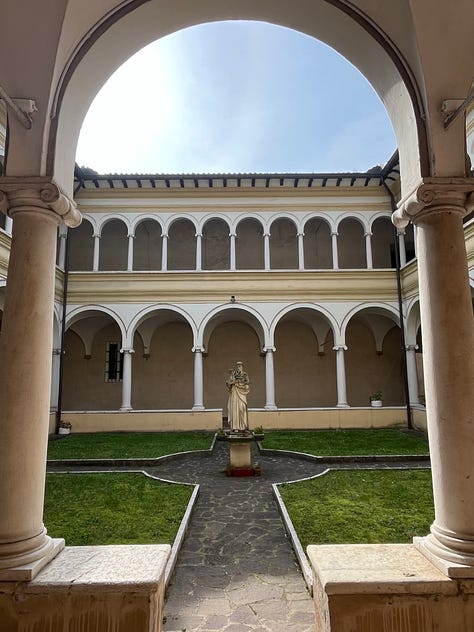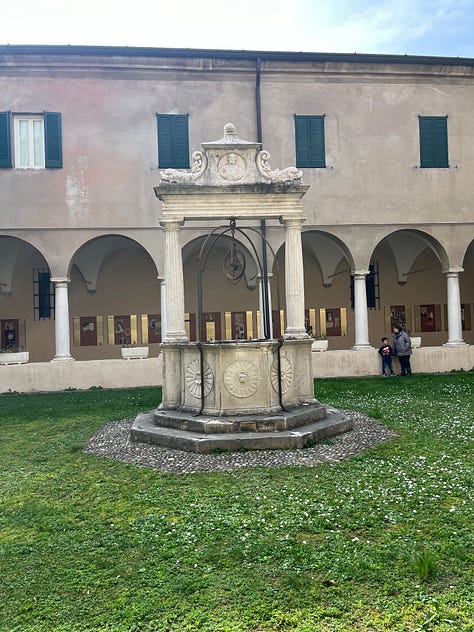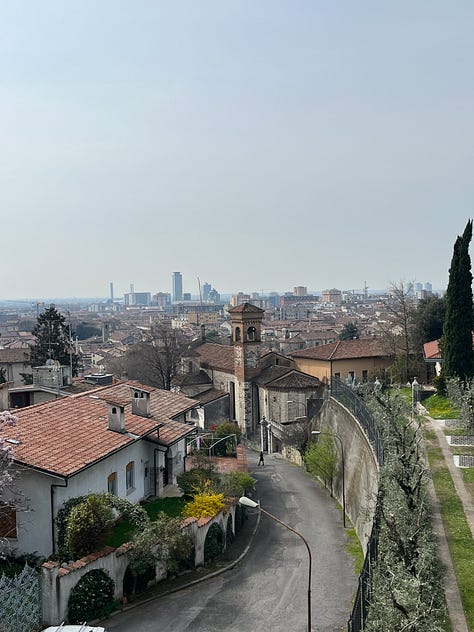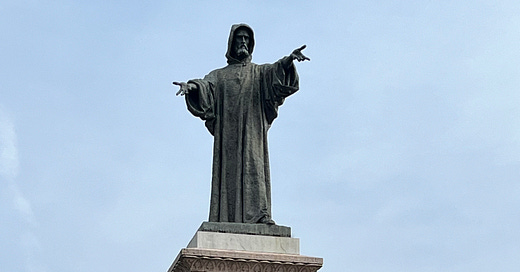Every time I meet someone on my travels, and they find out I'm writing about the 12th century, the inevitable question gets asked: "why that time period?" The honest answer, initially, is that I have always found Bernard of Clairvaux to be a fascinating and contradictory person, one of the towering figures of history most people have never heard of. But in studying Bernard during seminary, I got to know so many of the other characters and storylines of that time, and felt that it was a vastly under-represented time period in popular history.
Now that I've had more time researching and reflecting on that century, especially the first half of it, I remain fascinated by it. It is somehow the typical medieval age, while also defying many of the expectations we might have about how medieval people thought and lived. Yes, it was an era of warring kings and noblemen, of powerful popes and corrupt bishops, of pre- scientific misunderstandings about the world; but it was also an age of vigorous reformation in the church, of vibrant renaissance in philosophy and art, of violent revolution in politics and power.
While Bernard of Clairvaux is the dominant man of the time, and Peter Abelard the shining light of new thought, there is one person who I think typifies the questions and struggles of the early 1100s: Arnold of Brescia. The truth is, we know very little concrete information about Arnold's life and teaching, because he was eventually condemned and killed, his works burned. But the picture we can draw from what remains shows a man at the epicenter of all the conversations about church, politics, and thought happening at the time.
Arnold was a canon of the Augustinian order, which was founded in the late 11th century. the Augustinians were not monks, but pastors and clerics who lived in a monastic style, centered around churches or houses of hospitality. In some ways the Augustinians were precursors of the Franciscans, in the sense that they were focused on preaching and working in the world, rather than retreating to secluded monasteries. They occupy something of a middle ground, not quite the traveling mendicants who would come later but not the seperated Benedictines, either. The Augustinians were one of several new orders that sprang up around the late 11th/early 12th centuries as more and more faithful Christians sought to reform the church from within.
In his youth, Arnold traveled from Brescia, in northern Italy near Milan, to Paris; there he studied under Peter Abelard. Abelard was far and away the most famous and controversial philosopher and teacher of his age; his brilliant teaching brought students from all over the world, and his occasional scandals (especially his famous love affair with his former pupil Heloise) gained him notoriety. Arnold clearly connected with Abelard, because he would one day stand with him when others condemned him.
But before we get to that story, Arnold obtained some notoriety of his own. After studying with Abelard for a few years, he returned to his home town and entered the Augustinian community of San Pietro in Olivetto. His learning and humble lifestyle meant that he rose the ranks quickly and was soon the prior, the head of the community there. This was the simplest time of his life, as it seems he lived and taught in San Pietro for nearly 20 years.






However, everything changed when the citizens of Brescia rose up against the prefect of the city, who was under the control of the bishop. They wanted to form a commune, and establish self- rule in Brescia. The idea of a commune was spreading across northern Italy at the time, as city after city started forming senates or governing bodies made up of local nobles and/or regular citizens. It is from this time period that city-states like Florence and Genoa begin their rise to prominence as European powerhouses, with Venice having led the way as a republic several centuries earlier.
Arnold, rather than siding with the bishop of Brescia, sided with the people and helped barr the bishop from reentering the city. Eventually a settlement was reached, but the bishop convinced the Pope to condemn Arnold and expel him from Brescia. The Pope did not condemn Arnold as a heretic, but he did barr him from preaching and exiled him from Italy; and so after twenty years Arnold returned to Paris.
This would become a theme of Arnold's life: as soon as he settled somewhere, his preaching caused more trouble and he was chased out by the Pope or Bernard of Clairvaux, who found his teaching unacceptable. So what was it that Arnold taught that made everyone in power so uncomfortable and angry? We have no idea, because his writings were all burned. But as we will soon see, his story continued to collide with that of city communes, and so it seems that there was likely an element of anti-authoritarian, proto-democracy in what he preached.
Arnold was present at the Council of Sens (1141) when Bernard convinced a gathering of bishops to condemn Peter Abelard of heresy, and Arnold came in for his share of condemnation as well, though not as much as Abelard at that time. Arnold stood by his teacher, and returned to Paris to carry on his school while Abelard went to Rome to appeal to the Pope. Abelard never made it to Rome, though, stopping in Cluny where Peter the Venerable (who I've written about before) took him in, cared for him as he was sick, convinced the pope not to excommunicate Abelard, and even got Abelard and Bernard to reconcile before Peter died. Peter the Venerable: what a guy.
But back to Arnold. His return to Paris didn't last long, as Bernard of Clairvaux convinced the bishop of Paris, who already didn't like Arnold, to kick him out. So Arnold went to Zurich for a while, where once again Bernard wrote to the bishop and convinced him to get rid of Arnold again (Bernard actually suggested maybe locking up Arnold so Bernard wouldn't have to keep writing letters to new bishops, but the bishop of Zurich just moved Arnold along).
Bernard certainly comes off looking like the bad guy in Arnold's story, but we must remember it's more complicated than that. Assuredly, Bernard's conservatism (in a sense) was tightly strung, and he had no time for innovators in theology or church relations. But because we do not have any of Arnold's writing, nor do we have Abelard's condemned works, we cannot know to what extent Bernard was justified in taking up the mantle against their preaching. And as much as we'd like to make things simple, Bernard was also no stranger to standing up to powerful people when he felt it was right.
In a strange way, both Bernard and Arnold represented different strands of the reforming impulse of their time. Bernard was a Cistercian, one of the other new orders founded in the early 12th century, which practiced a more stringent and austere form of monasticism. Bernard wrote just as tirelessly against kings who abused their authority or bishops who went astray as he did thinkers he disagreed with like Abelard and Arnold. The facts seem to be that Bernard believed in a staunch separation between the church and the state, but in such a way that the church should retain its power, influence, and moral authority; while Arnold went a step further and wanted the church to renounce any claim to worldly authority whatsoever, which is more aligned with our modern ideas of church and state but a far cry from where things stood in the 12th century.
There is one more act in the story of Arnold, and it's a doozy. A few years after being kicked out of Zurich, he resurfaces in Rome, where he makes peace with the Pope and is reinstated to the good graces of the church. This is all the more surprising given that the new pope at that moment (1146) was Eugenius III, who had formerly been a Cistercian under the spiritual care of Bernard! Arnold's time on the Pope's good side was short-lived, however. The people of Rome had established a commune of their own a few years earlier (1144ish) and clashed with the Pope over who ran the city numerous times in the following years. Arnold quickly got involved with the commune's leadership, and became something of the de facto pastor of the Roman Republic.
The commune became so hostile to the Pope that Eugenius did not feel safe in Rome, and conveniently left for France to promote the 2nd Crusade for a while. In 1148, things had gotten so bad that he excommunicated Arnold, but the people of Rome stood by him as their pastor. This state of affairs lasted more or less unchanged until 1154, after Eugenius III had died and Adrian IV became Pope. Adrian decided enough was enough, and placed the city of Rome under interdict, which meant that all of the churches were closed and only the barest essentials could be practiced, such as infant baptism or last rites for the dying. While it might seem strange to us that the people would ignore Arnold's excommunication but listen to and fold under the pressure of an interdict, the Pope still wielded enormous religious influence in Rome, and he turned to this collective punishment to finally break the commune.
Arnold was forced to flee once more, but this time he was not allowed a new safe haven. He was captured, tried, and eventually killed as a heretic and traitor in 1155. His ashes were thrown into the Tiber river in Rome so that his burial site couldn't become a pilgrimage site. As mentioned, all of his writings were burned.
Arnold of Brescia represents the fascinating ways that politics, religion and philosophy collided in the 12th century. Here was one man who learned from Abelard the value of questioning ideas and challenging authority, and then put that into practice in his political and religious contexts. He remained a faithful and pious Christian, as far as we know, but he challenged the church's relation to power and urged church leaders to renounce secular authority. He also questioned the prevailing political notions of the time, either fostering or assisting proto- democratic revolutions in multiple Italian cities. While we can never know for sure the extent of Arnold's thought and action, whether he went astray in ways that would earn our condemnation today or not, we can definitively say that he represents one fascinating intersection of the reformation, renaissance and revolution taking place in the first decades of the 1100s.

***Much of the information for this article is taken from Phillip D. Johnson's Arnold of Brescia: Apostle of Liberty in Twelfth- Century Europe, which is perhaps slightly biased to see Arnold as a sympathetic figure but gathers the available information about him into one place admirably***



